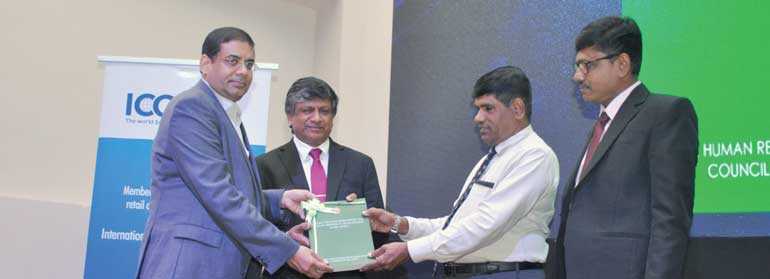Monday Feb 16, 2026
Monday Feb 16, 2026
Thursday, 28 November 2019 02:55 - - {{hitsCtrl.values.hits}}

The National Human Resources Development recently released a policy manual covering key recommendations for Human Resource Development in the country. The manual covers important recommendations covering many aspects of Human Resource Development and management. The first copy was handed to the then Secretary to the Prime Minister Saman Ekanayaka by Chairman NHRDC Dinesh Weerakkody at the CA Auditorium. R Rathnasiri the then Additional Secretary Ministry of National Policies and Economic Affairs is also present
The National Human Resources Development Council of Sri Lanka (NHRDC) together with Mead Johnson Nutrition, The Institute of Chartered Accountants of Sri Lanka (ICASL), The International Chamber of Commerce of Sri Lanka (ICC), and Daily Financial Times recently organised a forum, ‘Defying Retirement at 55 Years’ at the Auditorium of The Institute of Chartered Accountants, 30A, Malalasekara Road, Colombo 7. 
This forum discussed several ideas on how to get retirees back to work while enhancing their wellness, usefulness and fitness and how retirees can create a second career and returning to work would benefit would benefit the economy
High Commissioner of the People’s Republic of Bangladesh Riaz Hamidulla and Secretary Ministry of Highways and Road Development and Petroleum Resources Development Sunil Hettiarachchi was the Guest of Honour. Dean and the Chairman of the International Institute of Health Sciences Dr. Nihal De Silva delivered the keynote speech.
The event concluded with a panel discussion with experts: University of Sri Jayewardenepura Director of Mindfulness based Research Dr. Sanath Mahawithana, Women in Management in Sri Lanka/Maldives/Canada Founder/Chairperson Dr. Sulochana Sigera, Department of Labour Commissioner General R.P.A. Wimalaweera, Kaleidoscope Ltd. Chairman and CEO Santosh Menon, Janashakthi PLC Founder Chandra Schaffter, Employers Federation of Sri Lanka Director General and CEO Kanishka Weerasinghe, General and Interventional Cardiologist Dr. Gotabhaya Ranasinghe, and Institute of Policy Studies Director of Research Dr. Nisha Arunatilake.
The demographic trends during the last century shows an increase in longevity and a reduction in infant mortality and fertility rates – resulting a greater financial burden for the working population.
Official data from the Registrar General show that those over 50 years would reach 5.08 million in a population of 21.6 million in 2018. The retiring age is 55 years in the private sector with provision for extensions and 60 in the public sector with provision for extensions. In recent times, there has been a growing debate on retirement ages in Sri Lanka; whether they should be extended given that the country is rapidly seeing an increase in the aging population and a spurt in the number of those over 60 years.
Compared to other countries Sri Lanka has a lower retirement age. According to official data, in most countries, the age of retirement is 65 for men and 60 years for women. In a few countries, it’s even 67, while in Libya it’s 70 years. In the Asian region the age is much less; in China it’s 60 and Japan 62, while in South Asia, the age of retirement is 60 in India, 62 in Pakistan, 59 in Bangladesh and 58 in Nepal. Thus, Sri Lanka has the earliest retirement age at 55. Of the
200 listed companies in the Colombo Stock Exchange, in at least 50 percent of those who serve on the boards are 60 to 70 years showing that they are still sharp and good to provide leadership to most of the business entities.
Moreover, those who retire at 55 or 60 continue to work in the informal sector though not in the formal sector. One of the studies done by an economist at IPS has confirmed this statement. The panel also noted that the old age support schemes available in Sri Lanka are not inclusive and are inadequate for the majority of the people. Only those retiring from the public service receive a pension. The rest of the population does not either have access to a pension or the pension they receive is inadequate. The provident fund provides the security for private sector employees.
For many of those who worked in the low to middle income category many have to work in the informal sector till they are very old or until they are unable to work due to ill health.
The elderly population is still active and has a lot of experience by the time they reach the compulsory retirement age. The panel also noted the need to prepare the people for retirement so that the process is smooth and the retiree is ready to start a new chapter in his or her life. Even after retirement, many retirees are now willing to be in economically active, labour reform is must to facilitate this, the panel noted. A manual titled Proposals for Human Resource a Development was also officially launched.
Pix by Lasantha Kumara

